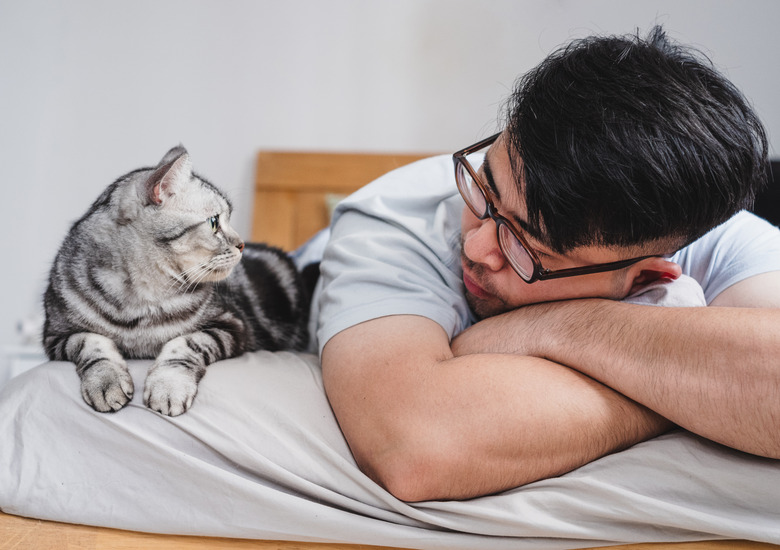Cats Domesticated Themselves Because They Do What They Want
Cats are such independent creatures that it should come as no surprise that there is scientific evidence to support the fact that they domesticated themselves. Once cats discovered humans, they knew that they had found people who would feed and cuddle them.
Thousands of years ago, cats found their way into human settlements, becoming domesticated in the process. Unlike dogs, though, they've kept much of their independent spirit and physical characteristics intact, though they still love cuddles with their humans.
Did cats domesticate themselves?
Did cats domesticate themselves?
Surprisingly, cats did domesticate themselves starting around 12,000 years ago in an area known as the Fertile Crescent, spanning from the Nile River to the Tigress to the Euphrates. Here, cats followed the rodent populations gorging on the grains that early agricultural societies produced. Once the cats arrived, they began hunting the mice and rats that were infesting the supplies of grain, ingratiating themselves into the local human population.
After the arrival of the cats, humans decided that they made great furry exterminators and encouraged them to stick around. It didn't hurt that cats themselves were adorable. Not only were they protecting the food supplies but they were offering snuggles as well.
How did we domesticate cats?
How did we domesticate cats?
After arriving to hunt rodents, humans in turn kept the cats around, not by putting them into cages or trapping them but by giving them food and shelter. While wildcats were solitary hunters, those who came to human settlements began to trust humans. Each successive generation then became more and more used to being cared for by humans and even spending time with other cats, making them more desirable and domesticated companions.
Humans even started taking cats with them on voyages around the world to protect the stores of grains on ships. This helped the felines spread throughout the world, where they continued to become more domesticated. In fact, two distinct lines of domesticated cats, including one from the Near East and one from North Africa, emerged over time.
Some, like the Egyptians, were so enamored with cats that they started to worship them in the form of a feline god named Bastet. There was also a feline goddess of fertility in India and China, and the Vikings had the feline goddess Frey.
Are cats less domesticated than dogs?
Are cats less domesticated than dogs?
So, are cats less domesticated than dogs? It turns out that there isn't much difference in the DNA of a wild cat and a domestic cat. This is in contrast with dogs, who don't share as much DNA with their wild relatives. That's because there wasn't much incentive for humans to change cats overall.
While domestic cats do tolerate people and other pets more than their wild brethren, much of their nature stayed intact because it meshed with human needs. What did change was their markings, which became more colorful; their size, which decreased; and their nature, which became more friendly.
Keep in mind that people had domesticated dogs much earlier than cats because dogs were used specifically for hunting. Later, when humans settled down in agricultural societies, the need for cats became evident since they provided a convenient form of rodent control.
Are cats really domesticated?
Are cats really domesticated?
While your tabby might seem like a wildcat when she has the zoomies around your living room, cats today are really domesticated. In fact, cats are classified as Felis catus, while their wild relatives are Felis sylvestris. Although they may share a lot of their DNA, cats have been domesticated to be the sweet little lap companions you know them to be.
Plus, domesticated cats sound much more adorable and pleasing to the human ear than their wild counterparts. Their brains are a bit smaller because they don't need to store up those sharp survival skills when humans are around to care for them.
That's not to say that they don't still work as pest control agents for humans, such as the feral cats who patrol Disneyland for rodents, but for the most part, cats today are happy to be kept at home, safe in your lap.
References
- ASPCA Pet Health Insurance: How Were Cats Domesticated?
- Burgess: Proof That Cats Domesticated Themselves
- Trusted Reviews: The Origins Of Cats – How Did Cats Become Domesticated?
- Nature Ecology & Evolution: The Palaeogenetics of Cat Dispersal in the Ancient World
- Good News Network: Ancient DNA Shows Cats Domesticated Themselves – Why Are We Not Surprised?
- National Geographic: Cats Domesticated Themselves, Ancient DNA Shows
- Inside the Magic: Disneyland Cats: The Feral Cats Who Live in the Park
